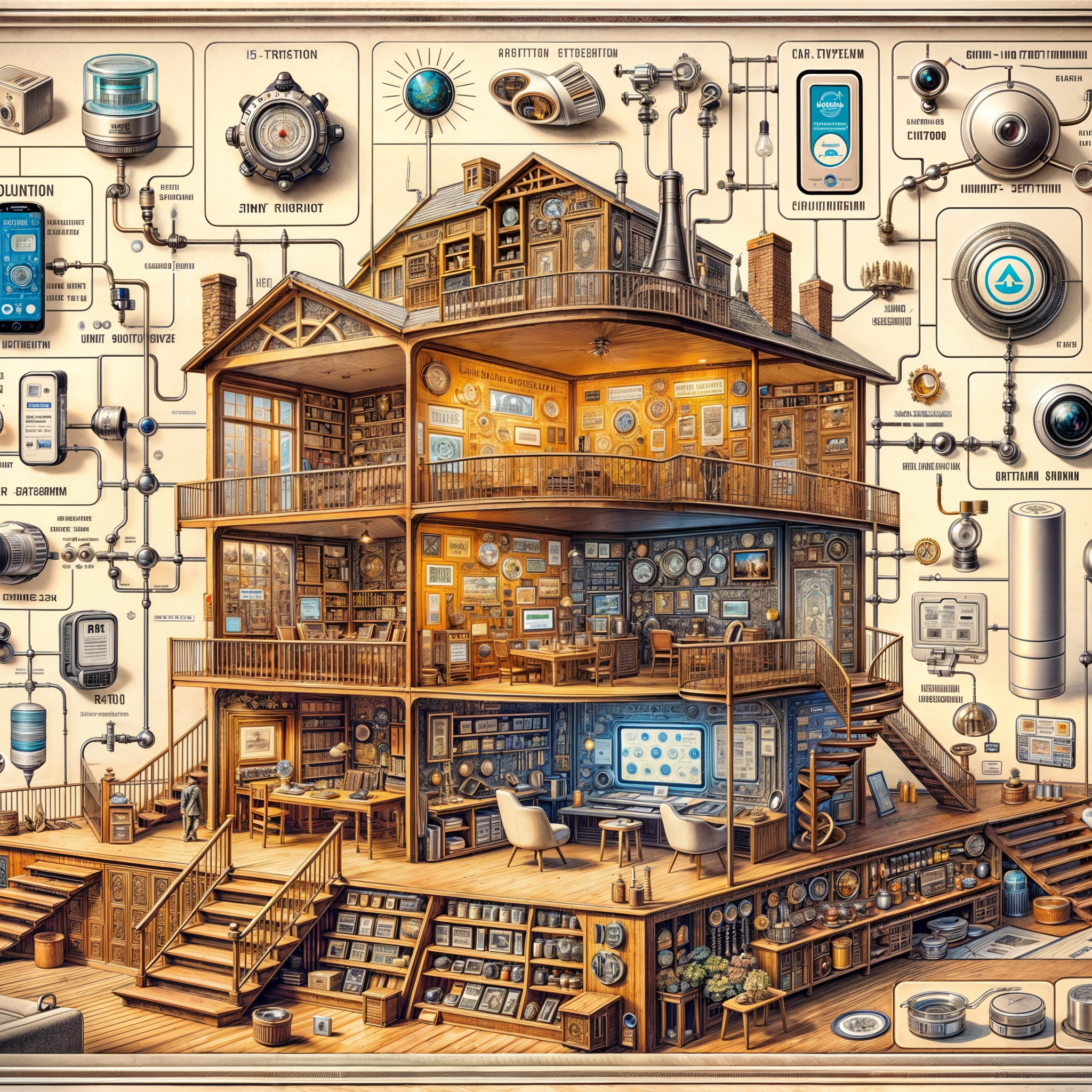Last Updated on February 23, 2024 10:14 am by Laszlo Szabo / NowadAIs | Published on February 23, 2024 by Laszlo Szabo / NowadAIs
AI in Everyday Life: Use of Artificial Intelligence for Daily Comfort – Key Notes in Bullet Points
- AI’s integration in daily routines is transformative.
- Machine learning algorithms personalize user experiences.
- AI assistants like Siri and Google Assistant shape interactions.
- Chatbots improve customer service with instant responses.
- AI contributes to healthcare, finance, and more.
Changing Our World: How Applications of Artificial Intelligence Transform our Everyday Life
Artificial Intelligence (AI) has become an integral part of our daily lives, reshaping how we work, entertain ourselves, and interact with the world around us.
Its pervasive influence extends from the simplicity of spam filters in our emails to the complexity of real-time traffic data that guides us through the busiest city streets.
AI, once a concept confined to the realms of science fiction, has now emerged as a cornerstone technology driving innovation across various industries.
The use of Artificial Intelligence in everyday life is not just about the convenience of digital assistants like Siri or the entertainment provided by Netflix’s recommendation algorithms.
It’s about the profound ways AI is making our lives easier, safer, and more connected. From machine learning that powers personalized user experiences to AI algorithms that detect fraudulent activities online, the wide range of applications are diverse and impactful.
This article aims to explore the depth and breadth of AI’s integration into our daily routines.
By highlighting the best examples of AI in action — from smart applications and websites that learn our preferences to AI-powered medical diagnostics that save lives — we will uncover the true impact of this technology on our world.
The importance of Artificial Intelligence goes beyond mere technological advancement; it represents a paradigm shift in how we solve problems, make decisions, and understand our environment.
As we delve into the examples of AI in daily life, we will see how this technology is not just an aid but a fundamental component of modern existence.
The capabilities of AI are continuously expanding, making it an indispensable tool in enhancing the efficiency and quality of our daily activities.
By understanding the applications and implications of AI, we can appreciate its role in shaping a future where technology and humanity converge for the betterment of society.
The Rise of AI in Daily Life

The integration of Artificial Intelligence (AI) into our daily lives marks a significant evolution in technology’s role in society. Initially, AI seemed like a distant concept from science fiction. However, it has seamlessly woven itself into the fabric of our everyday activities, transforming how we live, work, and interact with the world around us.
AI’s journey into our daily lives began with simple automation and computational tasks, aiming to enhance efficiency and reduce human error.
Early applications ranged from basic machine learning algorithms in finance to predict stock market trends to rudimentary chatbots in customer service. These applications set the stage for more sophisticated AI technologies.
As machine learning and Natural Language Processing (NLP) technologies advanced, AI applications became increasingly integrated into consumer products and services.
Today our World rely on AI – it’s omnipresent, from the smartphones in our pockets to the cars we drive, and even in the appliances in our homes.
This widespread adoption is largely due to AI’s ability to learn from data, adapt to new information, and perform complex tasks with remarkable accuracy and efficiency.
One of the most visible examples of AI in daily life is in personal virtual assistants, such as Siri and Google Assistant.
Tools based on AI understand spoken commands, answer questions, and perform tasks like setting reminders or playing music, showcasing the practical use of natural language processing in everyday tasks.
Moreover, AI’s rise is not just about convenience or entertainment; it’s also playing an important role in areas such as healthcare, where it helps in diagnosing diseases and personalizing treatment plans, and in environmental conservation, through monitoring and predicting climate changes.
The rise of AI in daily life underscores a profound shift in our relationship with technology, moving from passive users to active participants in an AI-enhanced world.
This evolution continues to unfold, promising even more innovative applications and opportunities to harness AI’s potential for the betterment of society.
Machine Learning and AI in Consumer Technology
Artificial Intelligence (AI) has revolutionized consumer technology, creating a more personalized and efficient user experience.
At the forefront of this transformation are AI assistants like Siri and Google Assistant.
Natural Language Processing is used to understand and respond to user commands, making daily tasks more convenient.
Whether it’s scheduling appointments, sending messages, or fetching information, AI-powered assistants have become integral to many people’s daily routines.
Another significant application of AI in consumer technology is in navigation and mapping services.
Apps like Google Maps analyze real-time traffic data, uses AI to help users and offering the most efficient routes and reducing commute times.
This capability is not only a testament to the power of AI in analyzing vast amounts of data but also its ability to significantly impact our daily lives by saving time and reducing stress associated with travel.
Beyond convenience, AI plays a pivotal role in personalizing the user experience across various platforms. Streaming services like Netflix and Spotify use AI algorithms to analyze users’ viewing and listening habits, respectively. Based on this analysis, these services recommend content tailored to individual preferences, enhancing user satisfaction and engagement. This personalization extends to online shopping, where AI is used to suggest products you might like, based on your browsing and purchase history.
Companies in AI Consumer Technology sector:
- OpenAI: A trailblazer in AI research and deployment, OpenAI has captivated the tech world with advancements like Dall-E 2 for high-resolution text-to-image generation and ChatGPT, a conversational AI that simulates human-like responses. Their innovations continue to push the boundaries of AI’s capabilities.
- Adept AI: Adept AI changes how AI interacts with computers by teaching models to execute plain language commands, enhancing productivity across various software applications.
- AlphaSense: This startup provides an AI search platform that enables professionals to efficiently sift through documents and data, offering sophisticated filtering, summarization, and visualization tools that go beyond traditional search functions.
- Amp Robotics: Focused on sustainability, Amp Robotics employs AI in recycling processes to improve sorting accuracy and efficiency, reducing landfill waste. Their technology represents a significant step forward in environmental conservation.
- Grammarly: As a writing assistant, Grammarly’s Artificial Intelligence helps millions daily to write clearer, more effective, and tone-appropriate content across emails, documents, and social media, demonstrating AI’s role in enhancing communication.
The integration of AI in consumer technology exemplifies the vast potential of AI to enhance our daily lives. By automating routine tasks, providing personalized experiences, and making information more accessible, AI technologies are not just changing the way we interact with devices but are also setting new standards for convenience and efficiency in our everyday activities.
AI Assistants in Communication and Social Interaction
Artificial intelligence has significantly transformed the way we communicate and interact in our social lives. One of the most visible applications is in the form of chatbots. These AI-powered assistants are now commonplace on various customer service platforms, providing instant responses to customer inquiries and improving the overall user experience. By leveraging natural language processing, chatbots can understand and respond to human language in a way that feels both personal and intuitive.
Another crucial area where AI is making an impact is in spam detection. Email platforms and messaging apps utilize sophisticated AI algorithms to filter out unwanted messages, protecting users from phishing attacks and other malicious content. This not only enhances security but also improves the quality of communication by ensuring that important messages are not drowned out by spam.
Language processing and translation services have also seen remarkable improvements thanks to AI. Applications powered by AI can now translate languages in real-time, breaking down barriers in international communication. This capability is not just limited to text but extends to spoken language as well, enabling real-time conversations between people who speak different languages.
Key companies from Communication ans Social Interaction sectors:
- OpenAI A nonprofit research firm that operates with an open-source model to facilitate collaboration in AI research. OpenAI is known for its development of ChatGPT and its commitment to making AI research accessible to the public.
- Avaamo: Avaamo specializes in conversational AI, offering businesses intelligent virtual assistants and chatbots powered by neural networks, speech synthesis, and deep learning. Its platform is designed for automating complex business use cases through multi-turn conversations, supporting over 114 languages and integration across 70 channels.
- Amazon Lex: Part of AWS, Amazon Lex provides a service for building conversational interfaces using voice and text. It leverages Automatic Speech Recognition and Text-to-Speech technologies, facilitating the development of intelligent conversational AI solutions for businesses.
- Oracle Digital Assistant: Oracle offers a conversational AI platform that enables the creation of chatbots capable of engaging in natural language conversations. It supports multilingual interactions and seamless integration with messaging apps, offering prebuilt chatbots for Oracle Cloud applications.
- Microsoft Bot Framework: This framework supports both code-first and no-code approaches to create conversational agents that can interact via channels like online sites, Slack, and Facebook. It integrates with Azure cognitive services for enhanced conversational capabilities.
- Cognigy.AI: Cognigy provides a low-code Conversational AI platform for automating contact centers, enhancing customer and employee communications. It enables users to design conversational flows and customize chatbots or virtual assistants for specific business needs.
- Baidu: Baidu, a leading Chinese multinational technology company, specializes in Internet-related services, products, and artificial intelligence. It is heavily investing in autonomous driving technology and uses machine learning to enhance its range of search services.
- Cisco Systems Inc.: Cisco Systems, a multinational technology corporation, designs and sells networking equipment and high-tech products and services. It is known for its contributions to IT and networking sectors, including new AI networking solutions.
- Facebook Inc. (now Meta Platforms): As a social media giant, Facebook Inc. has invested heavily in AI for improving user experiences, content moderation, and developing new technologies like virtual reality. Its AI research focuses on making interactions on its platform more engaging and safe.
The advancements in AI have thus significantly contributed to making our interactions more efficient, secure, and inclusive, demonstrating the profound impact of artificial intelligence in everyday life.
AI in Media and Entertainment – Computer Vision on Board
In the realm of media and entertainment, Artificial Intelligence and machine learning became main tool for creating more engaging and personalized experiences.
Generative AI, for instance, is at the forefront of content creation, enabling the generation of new images, videos, music, and even written content that can mimic human creativity.
This technology has opened up new possibilities for artists and creators, offering tools that can inspire and augment their creative processes.
AI image generators have captivated the public’s imagination, allowing users to create complex and artistic images based on simple text descriptions. These applications showcase the capabilities of AI in understanding and visualizing human ideas, providing a new medium for artistic expression.
Moreover, the use of AI in streaming services and social media has revolutionized how content is recommended to users. By analyzing vast amounts of data on user preferences and behavior, AI algorithms can suggest movies, songs, and other content that closely matches individual tastes. This personalization enhances the user experience, ensuring that audiences discover content that resonates with them on a personal level.
Some of the best from the AI in Media and Entertainment:
- Inworld AI: Specializes in creating AI-driven virtual characters and immersive realities for gaming and metaverse spaces, facilitating dynamic real-time interactions between human players and AI-powered characters.
- Rockstar Games: Known for integrating AI into blockbuster titles like Grand Theft Auto and Red Dead Redemption, Rockstar Games leverages AI to enhance gameplay and create immersive experiences.
- Electronic Arts (EA): With its dedicated R&D division SEED (Search for Extraordinary Experiences Division), EA explores cutting-edge AI technologies to enhance game realism and intelligence, particularly in non-player characters (NPCs).
- Unity Technologies: Offers a suite of game development tools enhanced by AI, facilitating intelligent automation and procedural content generation to streamline the game development process.
- Houdini by SideFX: A leader in 3D animation and visual effects software, Houdini uses AI to produce lifelike simulations for gaming and filmmaking, contributing to the creation of visually stunning experiences.
- Cleerly: This health tech company uses AI to analyze heart scans against a vast database to detect early signs of heart disease, showcasing AI’s potential in preemptive healthcare diagnostics
The impact of AI in media and entertainment extends beyond just personalization and content creation. It also includes the optimization of production processes, audience analytics, and even in the development of new forms of interactive entertainment. As AI technologies continue to evolve, their influence on the media and entertainment industries is set to deepen, promising even more innovative and immersive experiences for consumers.
Generative AI Capabilities in Healthcare
The integration of Artificial Intelligence (AI) in healthcare marks a great step towards innovative diagnostics, treatment planning, and patient care management. AI’s capabilities extend from analyzing medical records and imaging to providing personalized treatment plans and automating routine tasks, thus enhancing both patient outcomes and healthcare efficiency.
One of the most notable applications of AI in healthcare is in diagnostics. Machine learning models, trained on vast datasets of medical images, can now identify conditions such as cancers, neurological disorders, and heart diseases with accuracy comparable to, or in some cases surpassing, human experts. This not only speeds up the diagnostic process but also improves access to healthcare in underserved regions.
AI is also playing a pivotal role in treatment planning. For example, IBM’s Watson for Health uses natural language processing and machine learning to analyze the medical literature and patient data, assisting doctors in creating highly personalized treatment plans. Furthermore, AI-driven predictive models are used to forecast patient outcomes, enabling healthcare providers to make informed decisions about care pathways.
Drug development is another area where AI is making significant contributions. By analyzing biological and chemical data, AI algorithms can predict how different compounds might interact with targets in the body. This accelerates the drug discovery process, making it more cost-effective and increasing the likelihood of finding viable new treatments for complex diseases.
Telemedicine, powered by AI, offers remote patient monitoring, virtual consultations, and AI-assisted diagnostics, making healthcare more accessible. Especially in the wake of global challenges like the COVID-19 pandemic, AI-enabled telemedicine has proven to be invaluable in providing continuous care while minimizing the risk of virus transmission.
Top pioneer companies in healthcare industry:
- Merative L.P.: Merative L.P., formerly known as IBM Watson Health, is focusing healthcare with its advanced AI, data analytics, and cloud computing solutions. With a commitment to innovation, Merative focuses on enhancing medical research, clinical research, real-world evidence, and healthcare services, providing actionable insights that inform clinical, operational, and financial decision-making.
- Valo Health: Valo Health is at the forefront of integrating AI into drug discovery and development processes. By leveraging AI, Valo Health accelerates the identification of viable drug candidates and optimizes the drug development pipeline, promising to significantly improve the efficiency and success rate of bringing new therapies to market.
- XtalPi XtalPi combines quantum physics, chemistry, and artificial intelligence to revolutionize the pharmaceutical industry. Their AI-driven platform predicts molecular properties with high accuracy, aiding in drug discovery and development. This approach enables a more efficient design and selection of potential drug candidates.
- Atomwise Atomwise uses AI to streamline the drug discovery process. Their technology, based on deep learning algorithms, analyzes the molecular structure of compounds to predict their potential as drug candidates. This method significantly reduces the time and cost associated with traditional drug discovery processes.
- BenevolentAI BenevolentAI leverages artificial intelligence to decipher complex scientific data and accelerate the pace of scientific discovery. Their platform identifies potential therapeutic targets and drugs, aiming to transform the way medicines are discovered, developed, and brought to patients.
In conclusion, AI’s integration into healthcare is transforming the industry by improving diagnostics, personalizing treatment plans, accelerating drug development, and making healthcare more accessible. As AI technology continues to evolve, its impact on healthcare promises to be even more profound, offering hope for tackling some of the most challenging medical issues faced today.
AI Tools for Business and Industry
Artificial Intelligence (AI) is revolutionizing business and industry by optimizing operations, enhancing decision-making, and creating new opportunities for innovation. Across various sectors, from manufacturing to finance, AI’s machine learning algorithms and data analytics capabilities are driving efficiency and growth.
In the realm of data analysis and decision-making, AI systems analyze vast quantities of data to uncover patterns, trends, and insights that humans might overlook. This enables businesses to make more informed decisions, predict market trends, and tailor their strategies to meet consumer demands more effectively.
Supply chain management and logistics have been significantly improved thanks to AI. Machine learning algorithms predict demand, optimize inventory levels, and plan logistics to reduce delivery times and costs. Moreover, AI-driven robotics and autonomous vehicles are being integrated into warehouse operations and delivery systems, further enhancing efficiency and reducing human error.
Manufacturing is witnessing a transformation with the adoption of AI in predictive maintenance. By analyzing data from machinery sensors, AI can predict equipment failures before they happen, reducing downtime and maintenance costs. This not only extends the lifespan of the equipment but also ensures smoother operational flows.
Furthermore, AI is instrumental in developing personalized customer experiences. By analyzing customer data, businesses can tailor their offerings to meet individual preferences, improving satisfaction and loyalty. AI-powered chatbots provide 24/7 customer service, handling inquiries and resolving issues promptly, enhancing the overall user experience.
Top AI solutions in Business and Industry:
- OpenAI: OpenAI is a leading AI research organization with a focus on developing artificial general intelligence (AGI) that is safe and beneficial. Known for its significant contributions to AI through projects like GPT models and DALL·E, OpenAI aims to advance AI technologies while ensuring they contribute positively to humanity.
- DeepMind: DeepMind, a subsidiary of Google, specializes in AI research aimed at solving complex problems. Famous for developments like AlphaGo and AlphaFold, DeepMind’s work spans across various fields, demonstrating AI’s potential to advance scientific discovery and understanding.
- Builder.ai: Builder.ai focuses on democratizing software development using AI, enabling businesses to build custom software without extensive coding knowledge. Their platform simplifies the process of creating bespoke applications, making technology accessible to companies of all sizes.
- Abnormal Security: Abnormal Security leverages AI to provide next-generation email security, protecting organizations from targeted attacks, business email compromise (BEC), and more. Their platform analyzes diverse signals to detect and prevent sophisticated email threats.
- Speechmatics: Speechmatics offers advanced speech recognition technology powered by AI, capable of transcribing audio and video files into text accurately. Their solutions cater to various industries, enhancing accessibility and understanding across languages and dialects.
- Graphcore: Graphcore develops processors specifically designed for AI and machine learning applications. Their innovative hardware accelerates the computation required for AI workloads, enabling researchers and engineers to build more complex AI models efficiently.
- H2O.ai – This company provides an AI platform that allows users to build predictive models and analyze data without coding, serving a wide range of purposes from business analytics to healthcare, illustrating the democratization of data science through AI
AI’s impact on business and industry is profound, offering a competitive edge to those who embrace it. As AI technologies continue to evolve, their potential to transform various industry sectors is limitless, promising a future where businesses operate with unprecedented efficiency and innovation.
Ethical Considerations and Challenges of AI and Machine Learning
The integration of artificial intelligence (AI) into everyday life brings not only unprecedented convenience and efficiency but also significant ethical considerations and challenges. As AI systems become more prevalent, the importance of ethical AI development cannot be overstated. Ethical concerns include but are not limited to privacy issues, job displacement, and the potential for decision-making biases.
Privacy is a paramount concern as AI applications often rely on large datasets, including personal information, to train their algorithms. The question arises: how can we utilize AI without infringing on individuals’ right to privacy? Ensuring data protection and user consent are fundamental to ethical AI practices.
Job displacement is another critical issue. While AI and automation can enhance productivity, they also pose the risk of replacing human jobs, especially in sectors like manufacturing, customer service, and even professional services. Addressing this challenge requires a balanced approach, including retraining programs and the development of new job opportunities in the AI and technology sectors.
Moreover, AI systems can inherit biases from their training data or creators, leading to unfair decision-making processes. This is particularly concerning in applications related to hiring, law enforcement, and loan approvals. Developing unbiased algorithms and implementing rigorous testing for AI fairness are crucial steps towards mitigating these issues.
Ethical AI development demands a multidisciplinary approach, involving not only technologists but also ethicists, sociologists, and policymakers. By fostering an inclusive dialogue and establishing robust ethical guidelines and standards, we can harness the benefits of AI while safeguarding against its potential harms.
The Future of AI in Everyday Life
Looking towards the future, AI is poised to continue its transformative journey, further integrating into every aspect of our daily lives. The evolution of AI technologies promises not only to enhance existing applications but also to pioneer innovative solutions to complex global challenges.
In education, AI can offer personalized learning experiences, adapting to each student’s strengths and weaknesses, and providing teachers with tools to support their pedagogical goals. Environmental protection efforts will benefit from AI’s ability to analyze vast datasets, predicting climate change impacts and optimizing resource use.
Public safety and healthcare are also set to witness significant advancements thanks to AI. Predictive policing tools and emergency response systems will become more efficient, potentially saving lives by reducing response times and predicting crime patterns. In healthcare, AI will revolutionize patient care through precision medicine, enabling treatments tailored to individual genetic profiles, and furthering research into complex diseases.
Moreover, the continued development of AI technologies will drive innovation in virtually every sector, from smart cities and transportation to agriculture and finance. AI’s ability to process and analyze data at unprecedented scales will lead to more informed decision-making, increased efficiency, and the creation of new services and products.
However, realizing this future will require ongoing commitment to ethical AI development, addressing the challenges of privacy, employment, and bias. It will also necessitate a concerted effort from governments, industries, and the global community to ensure that the benefits of AI are accessible to all, paving the way for a future where AI enhances the human experience in every conceivable way.
Artificial Intelligence Changed Our Lives Forever
In the dynamic landscape of the 21st century, Artificial Intelligence (AI) stands as a beacon of innovation, reshaping the fabric of our daily lives with unparalleled speed and versatility.
The journey through various applications of AI, from the convenience of personal assistants like Siri to the profound impacts on healthcare, business, and entertainment, underscores the transformative power of this technology. AI, with its capability to analyze vast datasets, predict outcomes, and automate tasks, is not just a tool for efficiency but a pathway to new discoveries and solutions to age-old problems.
As we stand on the brink of this technological frontier, it is paramount to recognize the importance of responsible AI development.
Ethical considerations, including privacy, equity, and transparency, must guide the evolution of AI technologies to ensure they serve humanity’s broadest interests.
The future of AI in everyday life is not just about the sophistication of algorithms or the extent of automation but about enhancing human experience, fostering innovation, and creating a more inclusive and informed society.
The integration of AI into our daily routines is a testament to human ingenuity and a reminder of the ongoing need for critical engagement with technology. As AI continues to evolve, so too will its role in our lives, promising a future where the boundaries of what is possible are continually expanded, powered by the intelligence not just of machines, but of mankind itself.
Definitions
- AI: Artificial Intelligence, a field of computer science that enables machines to mimic human cognitive functions.
- Machine Learning: A subset of AI where algorithms improve through experience and use of data.
- Generative AI: AI that can generate new content, such as text or images, by learning from existing data.
- Natural Language Processing (NLP): AI that helps computers understand, interpret, and manipulate human language.
- AI Assistants: AI-based software that performs tasks for users based on commands or by anticipating needs.
- Chatbots: AI programs designed to simulate conversation with human users, especially over the internet.
Frequently Asked Questions
- What are some examples of AI in everyday life?
AI is present in digital assistants, smart home devices, online customer service chatbots, and personal fitness trackers. - How does machine learning enhance AI in everyday life?
Machine learning algorithms adapt and improve over time, personalizing and enhancing AI performance in daily tasks. - What role do AI assistants play in our daily lives?
AI assistants help with scheduling, reminders, information retrieval, and even controlling smart home devices. - How is AI changing customer service interactions?
AI-powered chatbots provide instant, 24/7 customer support and personalized service interactions. - Can AI in everyday life improve healthcare?
Yes, AI contributes to healthcare by aiding in diagnosis, treatment planning, and patient management. - How is AI used in home automation?
AI in everyday life makes homes smarter, from learning thermostats that adjust the temperature to voice-activated devices that manage your shopping list or play your favorite music. - What role does AI play in enhancing online security?
Everyday AI enhances security by monitoring unusual activity, using facial recognition for device access, and improving encryption across digital platforms. - How do AI assistants make daily scheduling more efficient?
AI assistants in everyday life can schedule appointments, set reminders, and even suggest the best times for meetings based on your habits and calendar. - Can AI in everyday life help with personal finance?
Yes, AI algorithms can analyze spending patterns, suggest budgets, and even invest money on behalf of users, streamlining personal finance management. - How does AI contribute to sustainable living?
AI systems optimize energy use in homes and offices, manage waste sorting with precision, and can predict the environmental impact of daily habits, promoting sustainability.
- What are some examples of AI in everyday life?












